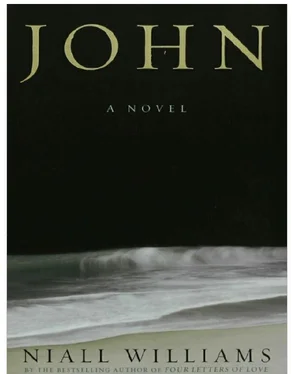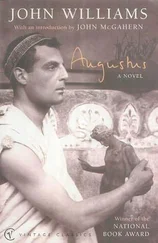They carry the furniture across the island and come down the shale to a crooked hut of stone and boat planking. An old fisherman sits there. They greet him.
'We are, all but two, leaving this island,' Danil says. 'We will leave with you what goods we have in thanks and blessing.'
The old man looks impassively at the gifts.
'There is more. We will bring more,' Meletios tells him, but in the tangled nets of wrinkles the fisherman's eyes do not brighten.
'You can tell all. There will be things of use to be shared,' Meletios continues. Then, uncertain the old man hears them, he raises his voice to call, 'WE GO TO EPHESUS. THE CHRISTIANS GO TO EPHESUS.'
Slightly the fisherman nods, but shows no emotion.
'To Ephesus. We go to Ephesus,' Danil says. He is a short, sturdy figure and his voice is strong.
The old man narrows further his eyes. His mouth is drawn tightly, a downward curve of dismay at all the world. The sunlight silhouettes the disciples before him. He says nothing. What is the price of this bounty? What is asked for all this Christian love? He and other of the fisher families on the island are considered converted, but the old fisherman knows the conversion is a convenience merely, a present tide. Once the Christians leave, their teachings will ebb away, the islanders will remain with only the concern offish and fire. Who knows what believers may come next? In his mouth the old man turns salt spittle of seaweed. Of his face the sun makes a wrinkled map. He makes no gesture or response to the gift, but studies the two disciples who stand puzzled before him.
Danil looks to Meletios.
'Peace of our Lord Jesus Christ be with you,' Meletios says. He raises a hand in blessing to the fisherman. But the old man remains unmoved. The blessing passes over him. The sun moves behind cloud. He considers a last time these two, sees the torrid future that awaits them in Ephesus, and the very texture of their skin paling with immanent ghosthood.
The disciples turn and walk away. When they are gone, the old fisherman rises and takes the table.
Gather up the fragments that remain, that nothing be lost.
You said.
Gather up the fragments that remain.
The Apostle keeps his word to teach to Papias. When Ioseph leaves, he walks first with the young disciple down the sand in silence. The bright wind blows, the sea tumbles near. This news of Simon must cause him suffering, but Papias sees it not. There is only this calm, this exterior of serene acceptance. He is the manifest of faith, Papias thinks. This is faith, this quiet in grief, this coming of knowledge, understanding of divine ordinance. He can learn this from the Master. He can learn to shorten the bridge between suffering and acceptance, to surrender himself, to understand. In the Apostle there must be sorrow. He must have thought to return one day, if not with Matthias and the others, then at least with Prochorus, with Simon, with Ioseph. But now there will be only the few. It must wound him, but he bears it so.
They step into the prints of themselves moving, where an apron of surf melts into sand. Above, seabirds hang like banners on the wind.
'Great work is ahead for us, Papias,'John says at last. His voice is almost without tone. There is no excitement or anticipation, but an even sounding as if the words are stones placed carefully to step a stream. 'In Ephesus we will begin a new time of the Lord. We will bring the Word of the truth.'
'The glory is at hand, Master,' Papias says.
Still they walk. The tide touches their ankles.
'Yes, Papias. But such will not be simple. We will meet with opposition. The world may not be ready.'
The blind apostle stops. He turns towards the youngest of them, in whom lies his greatest hope. He touches the air with his hand. Papias thinks to take it, but thinks better of it. He offers only the sleeved arm. For some moments there is this wordless bridge-way between them, frail transport of love and hope and faith.
'There are others gone before us. You know this, Papias.'
'Yes, Master.'
'There will be many Antichrists who will deny that Jesus is the Christ, is the Son of the Father.'
'I know.'
'But now, Papias, now it is the last time. And though we will sojourn in a place of mistrust, of jealousy, though we will be despised and by some hated, we will know one another.' His voice has a sudden quiver in it. In his lost eyes there moves perhaps the future. Perhaps in an inner white domain he can witness their coming, see them, the Christians, and how they will be received. His hand holds tightly the other's arm.
'Papias, we will know one another. We will know one another by love. For this is his Word. We will abide in him, that when he shall appear we will have confidence. Remember this. Behold what manner of love the Father hath bestowed on us that we should be called the sons of God: therefore the world knows us not, because it knew him not, Papias.'
The phrase is as a thorn at his eye. The Apostle winces. Because it knew him not. Through the deep layering of acceptance sings this oldest of wounds: that the world did not see. It is in him yet, this piercing. The world knew him not. And if it had? What history then there might have unfolded? What time of love and forgiveness? What if all had embraced him, allowed that the Father had sent his Son? What world might have been? In his mind John cannot white away the images of the thousands crucified, the roads marked with them, the thin, head-hung figures crying out from crosses in the darkening sky. Because it knew him not.
It is the grief of love: that in finding your heart blown open, in seeing the wonder and miracle of another, that this is not perceived by all. The love was not shared. The multitude that followed the signs was turned aside. They spat on him John loved. The wound leaks an old bitterness. The blind man tastes it rise and is quiet.
The seabirds come close to the two still figures, reclaiming their shore.
'We will abide in him,' Papias says. In his voice is a tremor, seeing a first glimpse of what lies ahead.
You are coming.
We go to meet you.
To prepare the time, for it is near now.
Truly, you are coming.
What turned before will turn back again. The multitude that was by the shores of the Sea of Galilee. The great number calling out your name that would have taken you and made you their king. When you left them and crossed the sea, they came after by shipping to the temple at Capernaum. They came, though already for healing on the Sabbath the Pharisees had spoken against you.
They came, their number great, their voices loud. We twelve about you in a circle. I, full of pride and love, not knowing they would turn.
I thought: your time is come. I thought: your glory has already begun.
Then said some from Jerusalem: 'Is not this he whom they seek to kill?'
And another: 'Do the rulers know that this is the very Christ?'
And above the murmuring you cried out: 'Ye both know me, and ye know whence I am; and I am not come of myself, but he that sent me is true, whom ye know not. But I know him, for I am from him, and he has sent me.'
And some pushed in the crowd to lay hands upon you, and I and James and Philip raised our hands to ward them back. But already they had sent officers to take you.
Already there was a turning.
Yet a little while am I with you, and then I go on to him that sent me.
And some said: 'This is the Christ.' But others, 'Can Christ come out of Galilee? Is not this man Jesus son of Joseph the carpenter?'
And the turning was as the sea and we upon it.
In the fall of even we went, the twelve, with you on to the Mount of Olives. But you withdrew further and we sat below and spoke of the unrest. Though the night was still and cool, I did not sleep. I watched where you sat further up on the mount, the stars about.
Читать дальше










